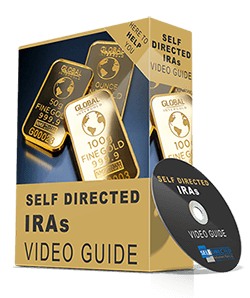What is Self-Directed 401(k)?
A self-directed 401(k) is a private pension plan sponsored by your business. Hence this account type is also known as a self-employed 401(k). It is a qualified retirement plan approved by the IRS. It follows the same rules and requirements as any other 401(k) plan. These rules were initially established in 1981. In 2001 the EGTRRA law was passed. This is commonly referred to as one of the two “Bush Tax Cuts.” This act made significant changes to the IRS code lowering taxes for qualified plans such as a personal 401(k) plan.
Like a self-directed IRA, a self-directed 401(k) also enables you to direct your retirement savings into a host of investment avenues, such as real estate, ppm’s (private placements) money lending, precious metals etc.
With this plan, you have complete flexibility to invest in anything you wish – as long as it is legal. You simply have to write a check and make the investments – they are not confined or stifled as most people are with their traditional brokerage retirement accounts.
Self-directed 401(k)s are perfect for self-employed consultants, contractors, sole proprietors etc.
Self-Directed 401(k) Eligibility Criteria
To open a self-directed 401(k), you must have some self-employed taxable compensation during the current financial year.
- You, and not an employer, are responsible for your income. Small business owners without employees (though spouses can contribute if they work for the business), Sole proprietors, freelancers, and independent contractors, normally meets this requirement.
- You must have earned income that is verified through tax records.
Start investing in Self-Directed 401(k) today!
How Does Self-Directed 401(k) Work?
There are two types of Self-Directed 401(k) i.e self-directed 401(k)s with limited control and then there are true checkbook controlled self-directed 401(k) plans. Certain financial institutions will assist you to open a new self-directed 401(k) plan. But beware – you will only be allowed to invest in products they represent.
If you have a checkbook controlled self-directed 401(k) (the one we establish), the whole alternative investment world awaits. You can certainly invest in “normal” investment vehicles such as stocks, bonds and mutual funds. But you can also invest in alternative assets, including real estate, private placements, or small business. You have the freedom to direct your money how you see fit. This is a step-wise representation of how self-directed 401(k) works:
-
Entity
If you have no current entity in the form of an LLC, sole proprietorship, or a C-Corp, SD Retirement Plans can help create the appropriate entity in the state of your choice.
-
Documentation
We will prepare the plan documents and file them with the IRS.
-
Contributions
You can roll over your IRA or 401(k) to a self-directed 402(k) or simply contribute a standard IRA/401K contribution.
Invest
You can make investments in alternative assets, which include real estate, small business, or private placements.
How to Setup Self-Directed 401(k)
You can fund your self-directed 401(k) in 3 ways: transfers, personal deferrals (contributions), and profit-sharing are the primary funding sources.
-
Transfers
an individual can transfer previous 401(k) funds, SEP IRA funds, SIMPLE IRA funds, and Traditional IRA funds – in fact, any previous “qualified” funds. Roth IRA funds cannot be transferred.
-
Contributions
personal deferrals are determined by age. If a client is under 50, they can have a personal deferral of 100% of their self-employed income up to $23,500 for 2025 ($23,000 for 2024,$22,500 for 2023 & $20,500 for 2022). For catch-up contributions, which are available to anyone over the age of 50, the limit is an additional $7,500 for 2025 ($7,500 for 2024, 2023 & $6,500 for 2022), bringing the total contribution limit to $31,000 ($30,500 in 2024, $30,000 in 2023 & $27,000 in 2022).
Profit-Sharing
the self-directed 401(k) plans we establish are also PSPs or profit-sharing plans. The IRS publication 560 establishes the amount of profit-sharing allowed and includes a step-by-step worksheet. In general terms, the profit-sharing can be up to 25% of the sponsoring entities’ profit.
Start Investing
A self-directed 401(k) empowers a plan participant to invest in a diverse range of investment options such as Real Estate – residential or commercial – rentals, foreclosures raw land, Tax Liens, Precious Metals, Private Placements, Foreign Currency, Hard Money Lending, etc.
Need help in setting up your Self-Directed 401(k)?
Self-Directed 401(k)
Investment Options
Self-directed 401(k) plans allow account holders to decide how and where they can invest their pre-tax retirement contributions. With a self-direct 401(k) plan, you are not limited to the pre-approved funds generally offered by traditional 401(k) plans; rather, you get to choose exactly where you want to invest your money. Some of the permissible alternative self-directed 401(K) investments options are but not limited to:
Benefits of
Self-Directed 401(k) Plan
-
Any contributions made to these plans, as well as investment returns and earnings, are tax-deferred until withdrawal, and your sponsoring business can receive tax benefits too.
-
You can opt for voluntary elective contributions from your salary, and your employer can also make contributions on your behalf.
-
In the tax year 2025, you are allowed to defer up to $23,500 ($23,000 for 2024, $22,500 in 2023, $20,500 in 2022) or all of your earnings annually (whichever is less), with catch-up contribution limits of $7,500 once you’re over the age of 50.
-
You retain greater control over investments and can choose where your funds will be invested from any of the options offered by the plan.
-
Self-directed 401(k) plans offer a wide range of investment options, including mutual funds, individual stocks and bonds, exchange-traded funds (ETFs), and non-traditional investments like real estate.
-
With a self-directed 401(k), you can incorporate real estate assets and other non-traditional investments into your portfolios. This can provide exceptional earning opportunities, which are not available to regular 401(k) investors.
-
If you are a savvy investor, you can put your experience to test, which you cannot do with a traditional 401(k) plan.
-
The number of investment choices gives you the liberty to be stringent in your selection process, helping you make quality investments.
-
If you are the type of investor who can maintain their calm during market volatility, you can make the most of the opportunities a self-directed 401(k) presents. This puts you at an advantage over mutual funds managed by someone else.
Self-Directed 401(k) Rules
1. 401(k) Contribution Limits
Each year, the IRS reviews and adjusts the maximum contribution limits for 401(k) plans and other retirement vehicles. Check the updated 401(k) contribution limits.
2. Disqualified persons
The definition of a “disqualified person” extends to any person who either has a financial interest in the plan or is providing services to the plan. The IRS considers you, the 401(k) account holder also as a disqualified person. This means that you cannot use your investments, property, and other investments, to benefit you. You also cannot use your real estate investment in your account as collateral to apply for a personal loan. Your parents, spouse, children (sons, daughters, and sons-in-law), grandparents, grandchildren, and their spouses are considered as disqualified persons. Your account administrator or account custodian, your account beneficiary, and any company in which you own at least 50% of the voting stock (directly or indirectly) are also considered as disqualified persons.
3. Prohibited Transactions
Under IRS rules, a self-directed 401(k) is prohibited from certain types of investments or transactions. Some examples are:
- Engaging in a Transaction with a Disqualified Person
- Plan participant buys a condo and lets daughter live there.
- Plan participant buys part of a business owned by his Father.
- Direct or Indirect Lending of Money
- Plan participant loans money to his wife or son.
- Father signs a loan guarantee for the Solo 401(k) Plan.
- Receiving Direct or Indirect Benefits of the Plan
- Plan participant buys a property and charges a management fee.
- Plan participant “fixes” a property himself rather than paying a 3rd non-disqualified party.
- Plan participant receives a commission for selling a property to the Plan.
4. 401(k) Distribution Rules
Self-directed 401(k) distribution rules are the same as those for any other 401(k) plan.
Need help to get started?
Resources
Self-Directed 401(k) Rollovers and Withdrawals
The rules for withdrawal and rollover rules for self-directed 401(k) plans are the same as traditional 401(k) plans or IRAs. If you withdraw money from your self-directed 401(k) before you reach age 59 1/2, you’ll attract a penalty of 10% of the amount withdrawn unless you qualify for an exemption. If you plan to roll over a self-directed 401(k) to an IRA, you have 60 days to complete the rollover. After 60 days, the money you withdrew from your 401(k) becomes taxable. Your brokerage that hosts your IRA can help you make a direct, penalty-free, and tax-free rollover. You can also consider rolling over your self-directed 401(k) to a self-directed IRA to have a high degree of control over your investments. For those interested, there is a way to roll over personal assets (no limit) into a self-directed Roth401 k, This program is not for everyone and will require the use of an experienced tax attorney (which we have). Done properly, this can result in huge tax savings for the plan owner and legacy planning.
FAQs
- Traditional IRAs
- Sep IRAs
- Roth IRAs
- 401(k)s
- 403(b)s
- Coverdell Education Savings (ESA)
- Qualified Annuities
- Profit Sharing Plans
- Money Purchase Plans
- Government Eligible Deferred Compensation Plans
- Keoghs
Still, if you have made up your mind on using Self-Directed 401K, then there are two ways of using this facility to fund the house. The first option is 401k loans and the second one is 401k hardship withdrawals.
Getting a 401K loan is easy and less costly irrespective of the requirement. The benefit is that interest paid on this loan is diverted to the 401K fund. On the flip side, be ready to shell out loan fees and miss out on tax benefits. If you end up as a defaulter, you will end up paying tax and a 10% penalty for early withdrawal.
Hardship withdrawal is an expensive risk you take by touching the 401k fund. By using this alternative, be ready to pay higher taxes, penalties, and forget about getting additional income from this savings fund.



